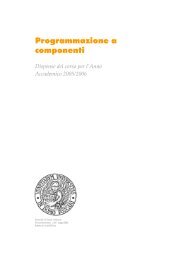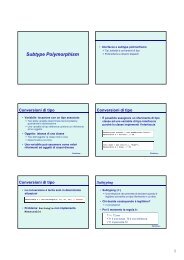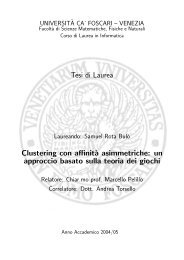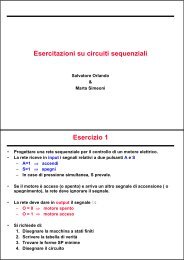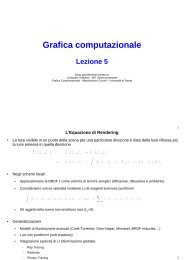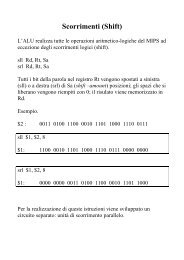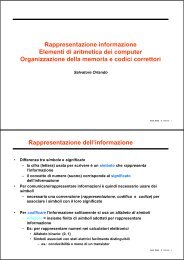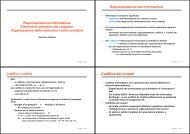Foscari - Dipartimento di Scienze Ambientali, Informatica e Statistica
Foscari - Dipartimento di Scienze Ambientali, Informatica e Statistica
Foscari - Dipartimento di Scienze Ambientali, Informatica e Statistica
You also want an ePaper? Increase the reach of your titles
YUMPU automatically turns print PDFs into web optimized ePapers that Google loves.
I can understand their surprise, because this country is famous for its wetness. Rain is our national<br />
weather. Snow can cause us problems, yes, and very hot weather, like last summer, causes <strong>di</strong>fficulties,<br />
too – but rain? With our wide experience, surely we should lead the world in rain management.<br />
Unfortunately not. Thousands of people had to leave their homes over the weekend, and thousands<br />
more are still trapped inside their houses. Some towns in the south had floods of up to five metres. In<br />
the north of England, some people still can’t go home after last month’s floods, which killed 8 people.<br />
Everyone is asking how such short rainstorms – just one hour in London, slightly longer in other places<br />
– could have such terrible results.<br />
In fact, the answer is partly because it all happened so quickly. Brize Norton in Oxfordshire had<br />
121.2mm of rain between midnight Thursday and 5pm Friday – a sixth of what it would expect for the<br />
whole year. South Yorkshire got a month’s worth of rain on June 25. It has been raining for weeks<br />
now, “and the ground is very wet, so imme<strong>di</strong>ately you get rainfall, you get runoff”, explains professor<br />
Adrian Saul, of Sheffield University.<br />
It isn’t just that the ground cannot absorb so much so fast – drainage systems get too full, too. “When<br />
you design a system you have to plan for possible dangers, and generally the plans are good enough to<br />
protect our communities,” says Saul. “It’s very lucky that the Victorians built the systems as big as they<br />
<strong>di</strong>d. Especially in London, they thought the city would get bigger, and that has protected London until<br />
now.” But London’s population is now four times as big – and last Friday, the sewers couldn’t handle<br />
so much water.<br />
“Our sewers are not designed to have so much water flowing through them,” says Nicola Savage, a<br />
spokeswoman for Thames Water. And they are not designed for the way we use them nowadays. “We<br />
each, personally, use much more water than ever before. Also, the public often use the sewers as a<br />
rubbish bin,” Savage adds. “People put things like babies’ nappies down the toilet. And also, we need<br />
to encourage people not to pour fat and oil down the sink. The sewers were never designed to handle<br />
this kind of thing.”<br />
Saul is also investigating how farmers can control the flow of water off land. If Farmers plough across<br />
hills, not down them, there will be less runoff. And carefully placed trees can help stop floo<strong>di</strong>ng. Also,<br />
the more animals walk over a piece of land, the harder the ground becomes, and the less water it can<br />
absorb. Then, plants can’t grow well, and there won’t be enough food. And if farm animals get no<br />
drinking water for 48 hours, thousands will <strong>di</strong>e, and meat will cost more.<br />
Scientists are also investigating how each of us can help reduce a problem that, in fact, we have helped<br />
create: by exten<strong>di</strong>ng our houses, paving driveways, and buil<strong>di</strong>ng car parks. All this takes away soft<br />
ground that could absorb water, and adds to the runoff into drains and rivers. And we should collect<br />
any water that runs off the house instead of letting it go into the sewerage system. We can use rainwater<br />
to flush toilets or run washing machines. Every little helps.<br />
For although this month’s weather in Britain has been very unusual, that may happen more, and more<br />
often, as our climate changes. Today people in Oxfordshire and Gloucestershire are having to leave<br />
their houses. Tomorrow, next month, next year – who knows?<br />
© Guar<strong>di</strong>an News & Me<strong>di</strong>a 2007<br />
First published in The Guar<strong>di</strong>an, 24/07/07<br />
Scanning for information<br />
First, read the text quickly to find the words and numbers in the box below. Underline them in<br />
the text.<br />
June 25<br />
five metres<br />
eight people<br />
10



